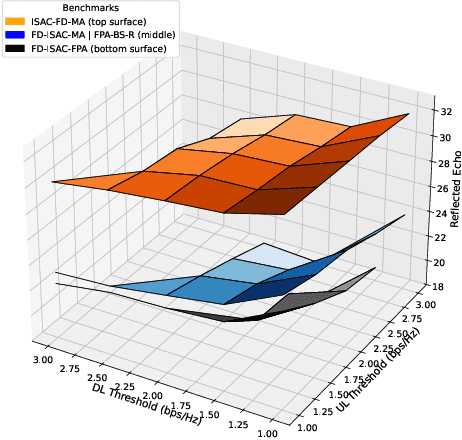Ali Amhaz
Meta-Learning-Driven Resource Optimization in Full-Duplex ISAC with Movable Antennas
Oct 01, 2025


Abstract:This paper investigates a full-duplex (FD) scenario where a base station (BS) equipped with movable antennas (MAs) simultaneously provides communication services to a set of downlink (DL) and uplink (UL) users while also enabling sensing functionalities for target detection, thereby supporting integrated sensing and communication (ISAC) technology. Additionally, a receiving BS, also equipped with MAs (denoted as BS R), is responsible for capturing the reflected echo. To optimize this setup, we formulate an optimization problem aimed at maximizing the signal-to-noise and interference ratio (SINR) of the captured echo. This is achieved by jointly optimizing the transmit beamforming vectors at the FD BS, the receiving beamforming vectors at both the FD BS and BS R, the UL users' transmit power, and the MAs' positions at both BSs, all while satisfying the quality-of-service (QoS) requirements for both sensing and communication. Given the non-convex nature of the problem and the high coupling between the variables, we employ a gradient-based meta-learning (GML) approach tailored for large-scale optimization. Numerical results demonstrate the effectiveness of the proposed meta-learning approach, achieving results within 99% of the optimal solution. Furthermore, the MA-based scheme outperforms several benchmark approaches, highlighting its advantages in practical ISAC applications.
Meta-Learning Driven Movable-Antenna-assisted Full-Duplex RSMA for Multi-User Communication: Performance and Optimization
Apr 04, 2025



Abstract:Full-duplex (FD) radios at base station (BS) have gained significant interest because of their ability to simultaneously transmit and receive signals on the same frequency band. However, FD communication is hindered by self-interference (SI) and intra-cell interference caused by simultaneous uplink (UL) transmissions affecting downlink (DL) reception. These interferences significantly limit the ability to fully exploit FD's potential. Recently, movable antenna (MA) technology has emerged as a groundbreaking innovation, offering an effective way to mitigate interference by adjusting the position of each MA within the transmitter or receiver region. This dynamic repositioning allows MAs to move away from high-interference zones to areas with minimal interference, thereby enhancing multiplexing gain and improving spectral efficiency (SE). In light of this, in this paper, we investigate an FD communication system by integrating it with MAs to evaluate and investigate its effectiveness in handling SI and intra-cell interference. Moreover, we utilize rate-splitting multiple access (RSMA) as our multiple access technique in both UL and DL transmission. To achieve the full potential of the system, we evaluated three different scenarios with FD-BS-RSMA with MAs where our goal is to maximize the total sum rate of the system by jointly optimizing the transmitting and receiving beamforming vectors, UL user equipment (UE) transmission power, MA positions, and common stream split ratio of RSMA while satisfying the minimum data rate requirements of all UEs, common stream constraint, power budget requirements of BS and UL UEs, and inter-MA distance. The formulated optimization problem is highly non-convex in nature, and hence, we propose a gradient-based meta-learning (GML) approach which can handle the non-convexity in a discrete manner by optimizing each variable in a different neural network.
Enhancing CoMP-RSMA Performance with Movable Antennas: A Meta-Learning Optimization Framework
Feb 24, 2025Abstract:This study investigates a downlink rate-splitting multiple access (RSMA) scenario in which multiple base stations (BSs), employing a coordinated multi-point (CoMP) transmission scheme, serve users equipped with movable antenna (MA) technology. Unlike traditional fixed-position antennas (FPAs), which are subject to random variations in wireless channels, MAs can be strategically repositioned to locations with more favorable channel conditions, thereby achieving enhanced spatial diversity gains.To leverage these advantages and maximize the achievable sum rate, we formulate an optimization problem that jointly determines the optimal transmit beamforming vectors at the BSs, the common stream allocation for different users, and the optimal positioning of the MAs, all while ensuring compliance with quality of service (QoS) constraints. However, the formulated problem is non-convex and computationally challenging due to the strong interdependence among the optimization variables. Traditional methods for solving large-scale optimization problems typically incur prohibitively high computational complexity. To address the above challenge, we propose a gradient-based meta-learning (GML) algorithm that operates without pre-training and is well-suited for handling large-scale optimization tasks. Numerical results demonstrate the effectiveness and accuracy of the proposed approach, achieving near-optimal performance (exceeding 97% compared to the optimal solution). Moreover, the MA-enabled CoMP-RSMA model significantly outperforms conventional benchmark schemes, yielding performance gains of up to 190% over the spatial division multiple access (SDMA) scheme and 80% over the RSMA FPA-based model. Finally, the proposed approach is shown to mitigate the sum-rate limitations imposed by interference in SDMA, achieving superior performance with fewer BSs.
Gradient-Based Meta Learning for Uplink RSMA with Beyond Diagonal RIS
Oct 23, 2024



Abstract:Beyond diagonal reconfigurable intelligent surface (BD-RIS) has emerged as an innovative and generalized RIS framework that provides greater flexibility in wave manipulation and enhanced coverage. In comparison to conventional RIS, optimization of BD-RIS is more challenging due to the large number of optimization variables associated with it. Typically, optimization of large-scale optimization problems utilizing traditional optimization methods results in high complexity. To tackle this issue, we propose a gradient-based meta learning algorithm which works without pre-training and is able to solve large-scale optimization problems. With the objective to maximize the sum rate of the system, to the best of our knowledge, this is the first work considering joint optimization of receiving beamforming vectors at the base station (BS), scattering matrix of BD-RIS and transmission power of users equipment (UEs) in uplink rate-splitting multiple access (RSMA) communication. Numerical results demonstrate that our proposed scheme can outperform the conventional RIS RSMA framework by 22.5$\%$.
 Add to Chrome
Add to Chrome Add to Firefox
Add to Firefox Add to Edge
Add to Edge